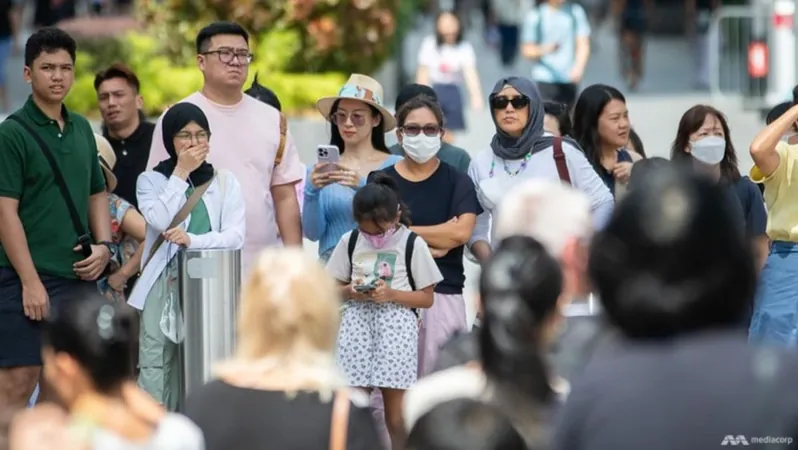
Seasonal Spike in HMPV Cases in Singapore Mirrors Historical Trends, MOH Reports
2025-01-07
Author: John Tan
Seasonal Spike in HMPV Cases in Singapore Mirrors Historical Trends, MOH Reports
Amid rising concerns regarding a surge in flu-like human metapneumovirus (HMPV) infections reported in China, Singapore's Ministry of Health (MOH) reassured residents that the increase in local cases aligns with established seasonal patterns of respiratory viruses.
Typically, more cases of HMPV surface during the end of the year, likely due to holiday gatherings and increased travel, MOH explained in a communication to CNA on January 7. In 2024 alone, data indicated that the weekly HMPV positivity rate among samples from Acute Respiratory Infections (ARI) fluctuated between 0.8% and 9.0%, peaking at 9.0% in December. This seasonal rise resembles trends observed in prior years.
Like other prevalent respiratory viruses—such as influenza and respiratory syncytial virus (RSV)—HMPV tends to follow a seasonal pattern, typically peaking during colder months in temperate regions, according to MOH.
In light of these developments, the public is urged to embrace robust personal hygiene practices. Key recommendations include frequent handwashing, particularly when traveling abroad, along with covering the mouth and nose when coughing or sneezing. Used tissues should be disposed of promptly. Individuals exhibiting mild respiratory symptoms are encouraged to remain at home until they fully recover. Should it be necessary to venture outside, it's vital to minimize social interactions, wear masks, and avoid congested areas.
Medically vulnerable groups—including young children, the elderly, and individuals with chronic health conditions—are advised to seek prompt medical attention if they display respiratory symptoms.
Understanding HMPV
HMPV is a commonly circulating respiratory virus that usually manifests as symptoms mimicking the common cold, including cough, fever, nasal congestion, and shortness of breath. While most cases are mild, severe infections can lead to serious complications such as pneumonia or bronchitis, particularly in younger children, older adults, and those with compromised immune systems.
Transmission occurs through close contact with infected individuals, touching surfaces contaminated with the virus, or exposure to respiratory droplets produced by sneezing or coughing.
While the World Health Organization (WHO) has not categorized HMPV as a global health emergency, the recent spike in cases has attracted attention, particularly as China faces a rise in respiratory infections amidst colder weather, which is expected to persist until March.
Experts in infectious diseases have noted that this trend is consistent with global patterns, where respiratory infections typically escalate during the late winter months. Notably, this uptick comes five years after the initial alert concerning the coronavirus outbreak in Wuhan, which incited a worldwide pandemic, straining healthcare systems and leading nations into lockdown.
Stay vigilant and informed as the HMPV situation evolves, and don’t forget: practicing good hygiene could make the difference in keeping yourself and your loved ones healthy this season.




 Brasil (PT)
Brasil (PT)
 Canada (EN)
Canada (EN)
 Chile (ES)
Chile (ES)
 Česko (CS)
Česko (CS)
 대한민국 (KO)
대한민국 (KO)
 España (ES)
España (ES)
 France (FR)
France (FR)
 Hong Kong (EN)
Hong Kong (EN)
 Italia (IT)
Italia (IT)
 日本 (JA)
日本 (JA)
 Magyarország (HU)
Magyarország (HU)
 Norge (NO)
Norge (NO)
 Polska (PL)
Polska (PL)
 Schweiz (DE)
Schweiz (DE)
 Singapore (EN)
Singapore (EN)
 Sverige (SV)
Sverige (SV)
 Suomi (FI)
Suomi (FI)
 Türkiye (TR)
Türkiye (TR)
 الإمارات العربية المتحدة (AR)
الإمارات العربية المتحدة (AR)